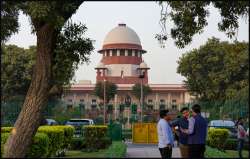Air pollution: Supreme Court rejects request for relaxation on GRAP-IV measures in Delhi
The Supreme Court of India has dismissed a plea for relaxation of GRAP-IV measures for air pollution in Delhi, emphasizing that such requests will only be considered if pollution levels show a consistent decline.

In a landmark judgment, the Supreme Court of India has dismissed a plea seeking relaxation on the Graded Response Action Plan (GRAP)-IV for pollution control in Delhi. While hearing a petition for relaxation of measures taken under GRAP-IV, the court asserted that it would only entertain any petition seeking relaxation from it when pollution levels display a consistent downward trend.
The GRAP-IV measures include, among other things, bans on construction activities, prohibition of burning coal and biomass, and closure of brick kilns triggered by alarming levels of air pollution in the national capital. Measures against this action address the severest air quality conditions besetting Delhi, a city noted for hazardous pollution levels, especially during the winter months.
The court also scheduled a hearing for Thursday, December 5, to address the modification of the applicability of GRAP-IV and to review the status of air quality in the region. The hearing will involve discussions on potential adjustments to the plan and its impact on the public and economy.
In the same order, the Supreme Court directed the Commission for Air Quality Management (CAQM) to coordinate more effectively in ensuring the implementation of air quality measures across the city. It emphasised the need for better communication between various concerned authorities, including the Municipal Corporation of Delhi (MCD), Delhi Police, and the Delhi Pollution Control Committee (DPCC).
The court also noted the concerning findings from the reports of court commissioners, revealing a serious lack of coordination among the authorities involved in enforcing pollution control measures. The Supreme Court highlighted the importance of the CAQM in facilitating coordination among these agencies to ensure timely and effective action.
Furthermore, the court directed the Delhi Police to ensure the safety and protection of court commissioners, who play a critical role in monitoring the implementation of air quality measures. The court underscored the need for adequate security for these officials, particularly as they carry out their duties in the face of possible resistance or public unrest.
The Supreme Court’s decision underscores the urgency of addressing the ongoing air pollution crisis in Delhi and reinforces the critical need for coordinated, swift action across all levels of government. The ruling also emphasises the role of judicial oversight in ensuring that the measures outlined in GRAP-IV are effectively executed, with a focus on the well-being of Delhi’s residents.